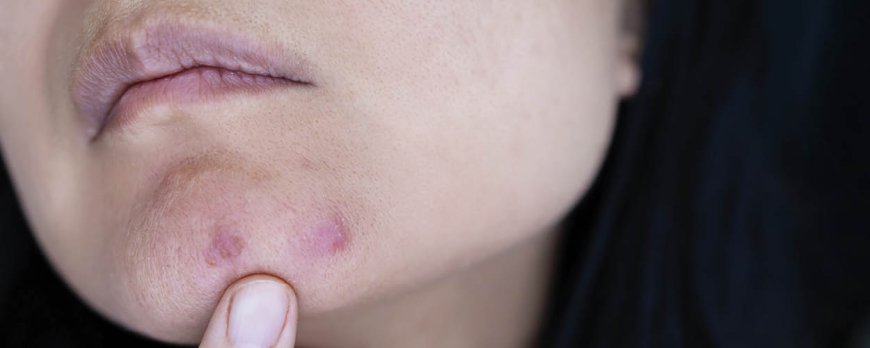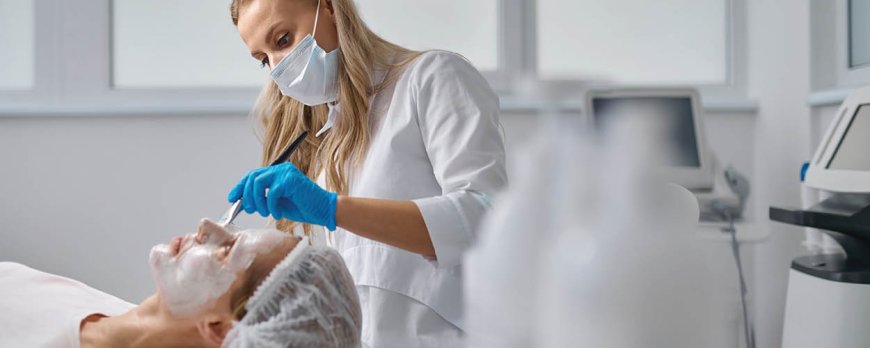Is doxycycline worth it for acne?
Is doxycycline worth it for acne? Discover the potential benefits, risks, and effectiveness of this antibiotic for skin health in our latest article.

How does doxycycline work for acne?
Doxycycline works by tackling acne at its source, targeting acne-causing bacteria and reducing inflammation on the skin. It belongs to a class of antibiotics called tetracyclines, which are known for their ability to inhibit the growth of bacteria. Specifically, doxycycline targets a type of bacteria called Propionibacterium acnes, which is commonly found on the skin and contributes to the development of acne.
By inhibiting the growth of these bacteria, doxycycline helps to reduce the presence of acne-causing bacteria on the skin, leading to a decrease in acne breakouts. Additionally, doxycycline has anti-inflammatory properties, which can help to calm the redness, swelling, and discomfort associated with acne.
Reducing Acne-Causing Bacteria
One of the primary ways in which doxycycline works is by inhibiting the production of proteins necessary for the survival and growth of acne-causing bacteria. By disrupting the bacteria's protein synthesis, doxycycline effectively curbs their ability to multiply and spread, ultimately reducing the number of bacteria on the skin.
While reducing acne-causing bacteria is a key component of acne treatment, it's important to note that doxycycline is typically prescribed for moderate to severe cases of inflammatory acne. It is often used in combination with topical acne medications to maximize the effectiveness of the treatment.
In conclusion, doxycycline is an antibiotic that works by targeting acne-causing bacteria and reducing inflammation on the skin. Its ability to inhibit bacterial growth and calm inflammation makes it a commonly prescribed treatment for moderate to severe inflammatory acne. However, it is important to use doxycycline under the guidance of a healthcare provider to ensure its safe and effective use.
Duration and Regimen of Doxycycline Treatment
The duration and regimen of doxycycline treatment for acne will vary depending on the severity of the condition and the healthcare provider's recommendations. Generally, doxycycline is prescribed for a period of three to four months, but this can be adjusted based on individual needs. It is important to follow the prescribed treatment plan diligently to achieve the best results.
Your healthcare provider will determine the appropriate dosage of doxycycline based on factors such as your weight, age, and the severity of your acne. Typically, the initial dosage for acne treatment is 50 to 100 milligrams taken once or twice daily. As your condition improves, your healthcare provider may reduce the dosage or frequency of administration.
Guidelines for Taking Doxycycline:
- Take doxycycline with a full glass of water to prevent irritation of the esophagus.
- Avoid taking doxycycline with dairy products, calcium supplements, or iron supplements, as they can interfere with its absorption.
- Follow your healthcare provider's instructions regarding food restrictions, as some formulations of doxycycline are better absorbed on an empty stomach.
- Do not lie down for at least 30 minutes after taking doxycycline to prevent irritation of the esophagus.
It is crucial to complete the full course of doxycycline treatment, even if you start seeing improvements in your acne. Stopping the medication prematurely can lead to a relapse or incomplete eradication of the acne-causing bacteria. If you experience any side effects or have concerns about your treatment, consult your healthcare provider for appropriate guidance.
Potential side effects of using doxycycline for acne
While doxycycline is generally safe, it can have side effects that should be considered before starting the treatment for acne. It is important to be aware of these potential adverse effects to make an informed decision about using doxycycline.
Common side effects of doxycycline for acne include nausea, upset stomach, and increased sensitivity to the sun. These reactions are generally mild and go away on their own as the body adjusts to the medication. It is advisable to take doxycycline with food or a full glass of water to minimize stomach upset.
In rare cases, doxycycline can cause more serious side effects. These may include severe allergic reactions, such as rash, itching, swelling of the face or throat, and difficulty breathing. It is important to seek immediate medical attention if you experience any of these symptoms.
It is also worth noting the following:
- Doxycycline can make you more prone to sunburn, so it is important to use sunscreen and protective clothing when going out in the sun.
- Doxycycline can interact with other medications, such as oral contraceptives, blood thinners, and antacids, so it is important to inform your healthcare provider about all the medications you are taking.
- Doxycycline is not recommended for pregnant women, as it can affect the development of the baby's teeth and bones. It is also not recommended for children under 8 years old, as it can cause permanent discoloration of the teeth.
Overall, while doxycycline is considered a safe and effective option for treating acne, it is important to weigh the potential benefits against the risks and consult with a healthcare provider to ensure its suitability for your specific situation. They can provide personalized advice, monitor your progress, and address any concerns or questions you may have.
Doxycycline Precautions for Specific Groups
Certain groups, such as pregnant women, children, and individuals allergic to tetracyclines, should exercise caution when considering doxycycline for acne treatment. While doxycycline is generally safe and effective for managing acne, it is important to be aware of potential risks and contraindications.
1. Pregnant Women: Doxycycline is not recommended for use during pregnancy as it can harm the developing fetus. It may interfere with bone and tooth development in the unborn baby. Pregnant women should consult with their healthcare provider to explore alternative acne treatment options that are safe during pregnancy.
2. Children: Doxycycline is generally not prescribed to children under 8 years old due to the risk of permanent tooth discoloration and impaired bone growth. Pediatric patients should consult with their healthcare provider to determine the most appropriate acne treatment options for their age group.
3. Tetracycline Allergy: Individuals who have a known allergy or hypersensitivity to tetracyclines, including doxycycline, should avoid its use. Allergic reactions can range from mild skin rashes to severe anaphylaxis. It is important to inform your healthcare provider about any known allergies before starting doxycycline.
It is crucial for individuals falling into these specific groups to consult with a healthcare provider before considering doxycycline for acne treatment. They can assess the individual's medical history, evaluate potential drug interactions, and recommend personalized treatment plans. By seeking professional advice, the risks associated with doxycycline can be minimized, and alternative treatment options can be explored if necessary.

Assessing the Overall Effectiveness of Doxycycline for Acne
Evaluating the overall effectiveness of doxycycline for acne requires considering scientific evidence and user reviews to gain a comprehensive perspective. Doxycycline is commonly prescribed for the treatment of moderate to severe inflammatory acne, and its success can vary depending on individual factors. Here, we explore the potential benefits and limitations of using doxycycline for acne treatment.
Scientific Evidence:
- Studies have shown that doxycycline can effectively reduce the abundance of acne-causing bacteria on the skin. By targeting the bacteria responsible for inflammation, it can help control acne breakouts and improve the overall appearance of the skin.
- Doxycycline also possesses anti-inflammatory properties, which can help calm existing acne lesions and prevent the formation of new ones. By reducing inflammation, it may promote faster healing and minimize scarring.
- However, it is important to note that doxycycline is not a permanent solution for acne. Its effects may diminish once treatment is discontinued, and acne may recur. Therefore, a comprehensive treatment plan that addresses the underlying causes of acne is crucial for long-term management.
User Reviews:
- Many users have reported positive outcomes with doxycycline for acne, noting a reduction in inflammation, fewer breakouts, and an overall improvement in skin appearance. However, individual experiences may vary.
- Some users have also noted side effects such as gastrointestinal discomfort, sun sensitivity, and yeast infections. It is important to discuss any concerns or potential side effects with a healthcare provider before starting doxycycline treatment.
- Users also emphasize the importance of consistency and adherence to the prescribed treatment regimen for optimal results. Skipping doses or discontinuing treatment prematurely may lead to less effective outcomes.
In summary, doxycycline has shown effectiveness in reducing acne-causing bacteria, calming inflammation, and improving the appearance of acne-prone skin. However, its efficacy may vary among individuals, and it should be used as part of a comprehensive treatment plan under the guidance of a healthcare provider. By considering scientific evidence and user reviews, individuals can make informed decisions about using doxycycline for acne and manage their expectations accordingly.
Alternatives to doxycycline for acne treatment
In addition to doxycycline, there are alternative treatment options available for acne, including non-antibiotic approaches and specific treatments for acne scars. These alternatives can be considered based on individual preferences, severity of acne, and desired outcomes. Here are some options to explore:
1. Topical treatments
Topical treatments, such as benzoyl peroxide or retinoids, are commonly used as first-line therapies for acne. These medications work by unclogging pores, reducing inflammation, and preventing the growth of acne-causing bacteria. Unlike oral antibiotics like doxycycline, topical treatments are applied directly to the affected areas and are less likely to cause systemic side effects. They can be used alone or in combination with other treatments.
2. Hormonal therapies
For acne that is influenced by hormonal imbalances, hormonal therapies may be recommended. These therapies, such as oral contraceptives or anti-androgen medications, help regulate hormone levels and reduce acne breakouts. They are particularly beneficial for females with hormonal acne. It is important to consult with a healthcare provider to determine if hormonal therapies are suitable and safe for individual needs.
3. Chemical peels and laser treatments
Chemical peels and laser treatments are effective options for addressing acne scars and improving overall skin texture. Chemical peels involve the application of a chemical solution to exfoliate the skin and reveal a smoother complexion. Laser treatments use high-energy light to stimulate collagen production and reduce scarring. These treatments should be performed by qualified professionals and may require multiple sessions for optimal results.
It is essential to consult with a dermatologist or healthcare provider before deciding on an alternative treatment for acne. They can assess the individual's skin condition, discuss the benefits and risks of each option, and develop a personalized treatment plan.
Doxycycline and its role in a comprehensive acne treatment plan
Doxycycline plays a vital role in a comprehensive acne treatment plan, which may involve the use of topical medications and adopting a holistic approach to acne management. When it comes to moderate to severe inflammatory acne, doxycycline is commonly prescribed by healthcare providers. It works by reducing acne-causing bacteria on the skin and calming inflammation, helping to alleviate acne symptoms.
In combination with topical acne medications, doxycycline can enhance treatment outcomes. The synergy between oral and topical treatments can address multiple factors contributing to acne, including excess sebum production, clogged pores, and bacterial colonization. By targeting these different aspects, a comprehensive approach can lead to more effective and long-lasting results.
While doxycycline can be an effective solution for acne, it is important to note that it should be used under the guidance of a healthcare provider. They can assess your specific condition, medical history, and potential interactions with other medications to ensure the treatment is safe and suitable for you. Additionally, they can tailor the treatment duration and dosage based on the severity of your acne and individual response to the medication.
Benefits of a comprehensive approach to acne treatment:
- Reduces acne-causing bacteria and inflammation
- Addresses multiple factors contributing to acne
- Potential for enhanced treatment outcomes
- Long-lasting results
In summary, doxycycline is a valuable component of a comprehensive acne treatment plan. By working in conjunction with topical medications and adopting a holistic approach, it can effectively target acne-causing factors and provide relief from symptoms. However, it is crucial to consult with a healthcare provider to ensure its appropriate use and to minimize the risk of side effects or interactions with other medications.

Consulting a healthcare provider before using doxycycline for acne
It is crucial to consult a healthcare provider before using doxycycline for acne treatment to ensure personalized guidance and consideration of individual factors. A healthcare provider will assess your specific situation, taking into account factors such as your medical history, current medications, and any potential interactions or contraindications. They can provide valuable insight into the appropriate dosage, duration of treatment, and possible side effects.
Doxycycline is a prescription medication that should only be used under the supervision of a healthcare professional. They will be able to determine if doxycycline is the right treatment option for your acne, based on the severity of your condition and any underlying health issues. Consulting a healthcare provider will help ensure that the use of doxycycline is safe and effective for you.
Additionally, a healthcare provider can offer guidance on complementary treatments and lifestyle changes that can enhance the effectiveness of doxycycline in managing acne. They can recommend suitable topical acne medications or other alternatives if doxycycline is not the best fit for your needs. By seeking professional advice, you can optimize your acne treatment plan and achieve the best possible results.
Remember, everyone's acne is different, and what works for one person may not work for another. Consulting a healthcare provider is a crucial step in getting personalized treatment that addresses your unique needs and concerns. They will ensure your safety, provide tailored recommendations, and help you make an informed decision about using doxycycline for acne treatment.
Summary of benefits and risks associated with using doxycycline for acne
Using doxycycline for acne offers potential benefits in reducing acne-causing bacteria and inflammation, but it is essential to be aware of the associated risks and precautions. Here is a summary of the benefits and risks you should consider:
Benefits:
- Reduces acne-causing bacteria: Doxycycline is effective in targeting the bacteria responsible for acne breakouts, helping to clear existing blemishes and prevent new ones from forming.
- Calms inflammation: By reducing inflammation in the skin, doxycycline can help to improve the appearance of redness and swelling commonly associated with acne.
- Complementary to other treatments: Doxycycline can be used in conjunction with topical acne medications to enhance the effectiveness of the overall treatment plan, providing a more comprehensive approach to managing acne.
Risks and Precautions:
- Side effects: While generally well-tolerated, doxycycline can cause side effects such as nausea, upset stomach, and sensitivity to sunlight. These side effects are usually mild and temporary, but it is important to be aware of them.
- Contraindications: Doxycycline is not recommended for pregnant women, children under 8 years old, or individuals allergic to tetracyclines. It is crucial to consult with a healthcare provider to ensure the medication is suitable for you.
- Interactions with other medications: Doxycycline may interact with certain medications, including antacids, vitamins, and blood thinners. It is essential to inform your healthcare provider about any other medications you are taking to avoid potential drug interactions.
In conclusion, while doxycycline can offer significant benefits in managing acne, it is important to consider the potential risks and precautions associated with its use. Consulting a healthcare provider is crucial to determine if doxycycline is the right treatment option for you, taking into account your individual circumstances and medical history. By working closely with a healthcare professional, you can ensure the safe and effective use of doxycycline for the treatment of acne.
Exploring the Personal Decision to Use Doxycycline for Acne
The decision to use doxycycline for acne should be guided by individual preferences, lifestyle factors, and the severity of the acne condition. While doxycycline is a commonly prescribed medication for moderate to severe inflammatory acne, it is important to consider various aspects before starting the treatment.
Here are some factors to consider:
- Personal Preferences: Everyone's preferences and comfort levels with medications can differ. Some individuals may prefer to explore non-antibiotic treatment options for acne, while others may feel more confident in using doxycycline. It is essential to understand your preferences and weigh them against the potential benefits and risks of the medication.
- Lifestyle Factors: Lifestyle factors, such as daily routines and responsibilities, can also influence the decision to use doxycycline for acne. For example, if you have a busy schedule or travel frequently, it may be important to consider the practicality of adhering to a medication regimen that requires regular dosing.
- Acne Severity: The severity of your acne can play a role in determining the appropriateness of using doxycycline. If you have mild acne that is not causing significant distress or scarring, alternative treatment options or topical medications may be worth considering before resorting to oral antibiotics.
Ultimately, the decision to use doxycycline for acne is a personal one that should be made in consultation with a healthcare provider. They can assess your individual circumstances, discuss the potential benefits and risks, and provide guidance on whether doxycycline is the most suitable treatment option for your specific needs.

Conclusion
Doxycycline offers potential benefits in treating acne, but it is crucial to evaluate its risks and consult with a healthcare provider before making a decision. As a commonly prescribed medication for moderate to severe inflammatory acne, doxycycline works by reducing acne-causing bacteria on the skin and calming inflammation. It is typically used in combination with topical acne medications to enhance its effectiveness.
The duration of doxycycline treatment varies, but it is usually recommended for around three to four months to achieve optimal results. However, it is important to note that doxycycline can have side effects, including nausea, upset stomach, and increased sensitivity to the sun. Additionally, it may interact with other medications, highlighting the importance of consulting a healthcare provider to ensure its safety and suitability for individual needs.
While doxycycline is considered a safe and effective option for treating acne, it should not be used by pregnant women, children under 8 years old, or individuals with a known allergy to tetracyclines. These contraindications emphasize the need for professional guidance and personalized treatment plans.
In conclusion, doxycycline can be a valuable tool in managing acne, but it is essential to approach its use with caution and under the supervision of a healthcare provider. By evaluating the potential benefits and risks associated with doxycycline and considering individual factors, individuals can make informed decisions about their acne treatment options and work towards achieving clearer and healthier skin.
FAQ
How does doxycycline work for acne?
Doxycycline works by reducing acne-causing bacteria on the skin and calming inflammation, which helps in treating moderate to severe inflammatory acne.
What is the duration and regimen of doxycycline treatment for acne?
The duration of doxycycline treatment for acne varies, but it is typically around three to four months. The exact regimen and dosage should be determined by a healthcare provider.
What are the potential side effects of using doxycycline for acne?
Potential side effects of using doxycycline for acne include nausea, upset stomach, sun sensitivity, and potential interactions with other medications. It is important to be aware of these possible adverse effects.
Are there any precautions for specific groups when using doxycycline for acne?
Doxycycline is not recommended for pregnant women, children under 8 years old, or individuals allergic to tetracyclines. It is important to consider these precautions before using doxycycline for acne treatment.
How effective is doxycycline for treating acne?
Doxycycline is considered a safe and effective option for treating acne, but individual results may vary. It is recommended to consult a healthcare provider for an assessment of its suitability for each individual case.
What are the alternatives to doxycycline for acne treatment?
There are non-antibiotic approaches and other medications available as alternatives to doxycycline for acne treatment. It is worth discussing these alternatives with a healthcare provider to determine the most suitable option.
How does doxycycline fit into a comprehensive acne treatment plan?
Doxycycline can be used in combination with topical acne medications as part of a comprehensive acne treatment plan. A holistic approach can help optimize the treatment outcomes.
Is it necessary to consult a healthcare provider before using doxycycline for acne?
Yes, it is important to consult a healthcare provider before using doxycycline for acne. They can provide personalized advice based on medical history, potential drug interactions, and individual treatment plans.
What are the benefits and risks associated with using doxycycline for acne?
The benefits of using doxycycline for acne include its efficacy in reducing acne-causing bacteria and calming inflammation. However, there are potential side effects and precautions to consider. It is important to weigh the benefits against the risks.
How should I make the personal decision to use doxycycline for acne?
The personal decision to use doxycycline for acne should take into account individual preferences, lifestyle, and the severity of acne. It is important to align treatment options with specific needs and goals.



































































































































